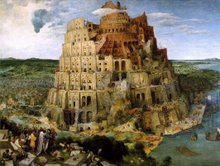 There seems to be a trend among contemporary pop artists lately: attempting to inseminate their image into the past - perhaps, with the goal of somehow giving some historical relevance to their work which extends beyond vapid, desultory references to pop culture and 20th century Art history. Perhaps they are subconsciously aware that if you remove all the context, their work has little, if anything to say on its own. Thus, because it only embodies what is projected upon it, speaks only to its own time. It is nothing more than a manifestation of the particular biases and fashions of its day and when these biases and fashions change, will one day be merely a name and a picture in an Art history book. It will likely be regarded with embarrassment in much the same way we look back upon an old year book photograph of ourselves in our "Miami Vice" phase .
There seems to be a trend among contemporary pop artists lately: attempting to inseminate their image into the past - perhaps, with the goal of somehow giving some historical relevance to their work which extends beyond vapid, desultory references to pop culture and 20th century Art history. Perhaps they are subconsciously aware that if you remove all the context, their work has little, if anything to say on its own. Thus, because it only embodies what is projected upon it, speaks only to its own time. It is nothing more than a manifestation of the particular biases and fashions of its day and when these biases and fashions change, will one day be merely a name and a picture in an Art history book. It will likely be regarded with embarrassment in much the same way we look back upon an old year book photograph of ourselves in our "Miami Vice" phase .
Like his American counter-part, Jeff Koons in 2008, Takashi Murakami has mounted an exhibition of his opulent, pop-psychedelia in the Château de Versailles in France. And in some ways it's befitting for the two Art stars to exhibit here. Like the French Aristocracy before them, both Koons and Murakami have built their empires on the backs of the lowly peasant workers, exploiting their skills, resources, conspiring with other aristocrats, and manipulating markets. And Murakami's work, unlike Koons' more minimalist sculpture, does meet the copious extravagance of Versailles with its own exaggerated theatricality. But the accord ends there. The architecture and frescoes of Versailles, even with their Rococo superficiality, display a relative sea of content and gravitas compared with Murakami.
In fact, I can only glean a single message actually conveyed by the work itself, glistening beneath the surface of the tepid kiddie-pool that is Murakami's exhibition:
Let them eat cake.






